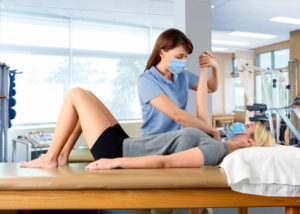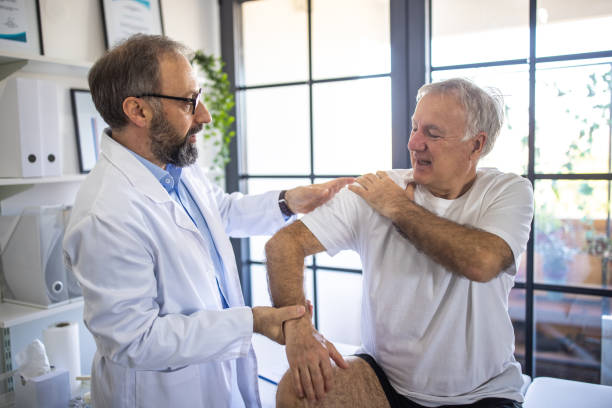When it comes to rotator cuff surgery, there are many factors to consider. When not to have rotator cuff surgery? When is it necessary? In this blog post, we will explore more about rotator cuff surgery and when is it recommended.
What Is A Rotator Cuff?
The shoulder joint is surrounded by a group of muscles and tendons known as the rotator cuff. These muscles and tendons assist in the raising of the arm.
The rotator cuff can be injured in many ways. The most common way is overuse. This can happen from work or sports. Other times, the rotator cuff can be injured from a fall or car accident.

When Is Rotator Cuff Surgery Necessary?
Most people with rotator cuff injuries will not need surgery. The majority of people will recover with nonsurgical treatments such as rest, ice, and physical therapy. However, there are some cases when surgery is necessary. These cases include:
- A large tear in the rotator cuff that does not heal with nonsurgical treatments
- A rotator cuff tear that is causing severe pain and weakness
- A rotator cuff tear that is preventing you from doing your daily activities
If you have any of these problems, your doctor may recommend rotator cuff surgery.
What Happens During Rotator Cuff Surgery?
During rotator cuff surgery, the surgeon will make an incision in the shoulder. Then, they will repair the torn tendon or muscles. In some cases, the medical team may need to remove part of the bone to fix the problem. The surgery usually takes about 1 to 2 hours. You will likely stay in the hospital overnight. You may need physical therapy after surgery to help regain movement and strength in your shoulder.
What Are The Risks Of Rotator Cuff Surgery?
As with any surgery, there are risks. These risks include infection, bleeding, and blood clots. There is also a risk that the rotator cuff surgery will not fix the problem. You may still have pain or weakness in your shoulder after surgery.
When Not To Have Rotator Cuff Surgery?
The first thing to consider is the severity of your rotator cuff injury. If you have a small tear, you may be able to treat it with physical therapy and rest. However, if you have a large tear or your rotator cuff is otherwise severely damaged, surgery may be the best option.
Another factor to consider is your age. As we age, our bodies heal more slowly and are less able to repair themselves. This means that surgery may be more successful in younger patients than in older patients.
Finally, your overall health is an important consideration. If you have other health conditions that could complicate surgery, you may want to wait to have rotator cuff surgery until these conditions are under control.
If you are considering rotator cuff surgery, talk to your doctor about all of these factors. Together, you can decide if surgery is the best option for you for it is quite expensive having rotator cuff surgery.
What Causes Rotator Cuff Tears
- Repetitive Motions – The most common way that people develop rotator cuff tears is from repetitive motions. This can happen from work or sports.
- Injury or Trauma – Another common cause of rotator cuff tears is trauma, such as a fall or car accident.
- Age – As we age, our bodies heal more slowly and are less able to repair themselves. This means that surgery may be more successful in younger patients than in older patients.
- Overall health – Another important consideration is your overall health. If you have other health conditions that could complicate surgery, you may want to wait to have rotator cuff surgery until these conditions are under control.
- Inflammation – Inflammation is another common cause of rotator cuff tears. This can be from arthritis or other conditions.
- Degenerative changes – Degenerative changes are another common cause of rotator cuff tears. This means that the tendon or muscle has worn down over time.
- Tumors – Tumors are a rare cause of rotator cuff tears, but they can occur.
How Would I Know If I Have A Rotator Cuff Tear?
Several symptoms can occur with a rotator cuff tear. These include:
- Pain – The most common symptom is pain. This pain may be mild at first, but it can become severe over time.
- Weakness – You may also notice weakness in your shoulder. This may make it hard to do your daily activities.
- Cracking or popping – You may hear cracking or popping when you move your shoulder.
- Swelling – You may have to swell around the rotator cuff area.
How Is A Rotator Cuff Tear Diagnosed?
Your doctor will ask about your symptoms and medical history. They will also do a physical exam of your shoulder. This will help them rule out other conditions that could cause similar symptoms.
Your doctor may also order imaging tests, such as an MRI or X-ray. These tests can help them see the extent of the damage to your rotator cuff.

How Is A Rotator Cuff Tear Treated?
The first step in treatment is to rest your shoulder and give it time to heal. You may also need to use ice or heat to reduce pain and swelling.
Your doctor may also recommend physical therapy. This can help stretch and strengthen the muscles around your shoulder.
If these treatments do not work, you may need surgery to repair the rotator cuff tear. Surgery can be done with a traditional open incision or with a less invasive arthroscopic procedure.
After surgery, you will need to rest your shoulder and do physical therapy. This can help you regain strength and range of motion in your shoulder. In complicating surgery, you may want to wait to have rotator cuff surgery until these conditions are under control.
What Are The Complications Of Rotator Cuff Surgery?
As with any surgery, there are risks associated with rotator cuff surgery. These risks include:
- Infection – There is a small risk of infection after rotator cuff surgery.
- Bleeding or blood clots – There is also a risk of bleeding or blood clots after surgery.
- Nerve or blood vessel damage – There is a risk of damage to nerves or blood vessels during surgery.
- Failure to heal – In some cases, the rotator cuff does not heal correctly after surgery. This may require another surgery to fix the problem.
What Are The Success Rates Of Rotator Cuff Surgery?
The success rates of rotator cuff surgery are generally high. However, the success of the surgery depends on many factors. These include the type of tear, the location of the tear, and your overall health.
Most people who have rotator cuff surgery experience a significant improvement in pain and function. However, it may take several months for the full effects of the surgery to be seen.
Conclusion
In conclusion, the best way to avoid needing rotator cuff surgery is to prevent repetitive motions or injuries to the shoulder. However, if you do need surgery, it is important to consider all factors before making a decision. Surgery may not be successful in older patients or in those with other health conditions that could complicate the surgery.

